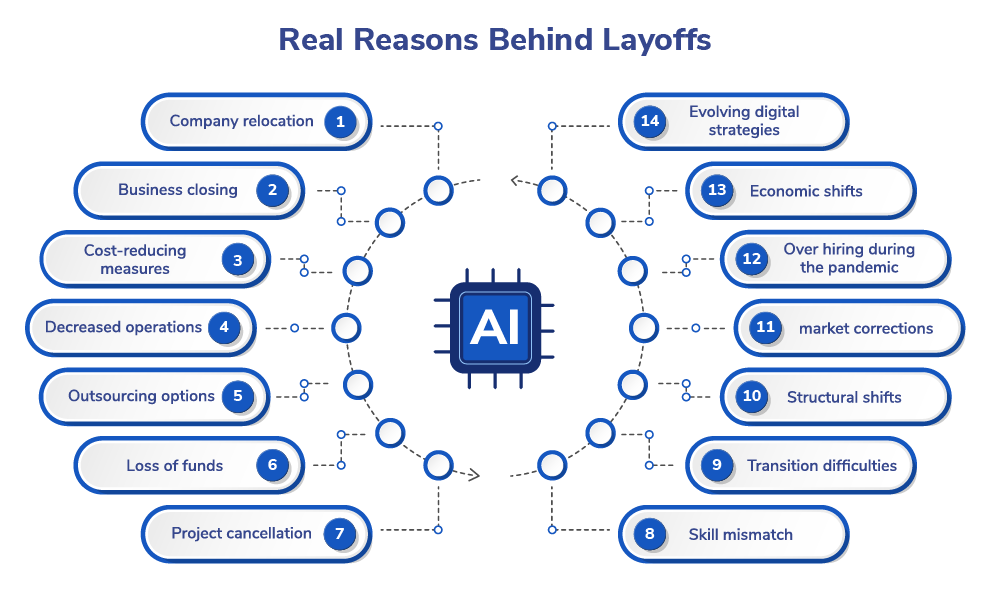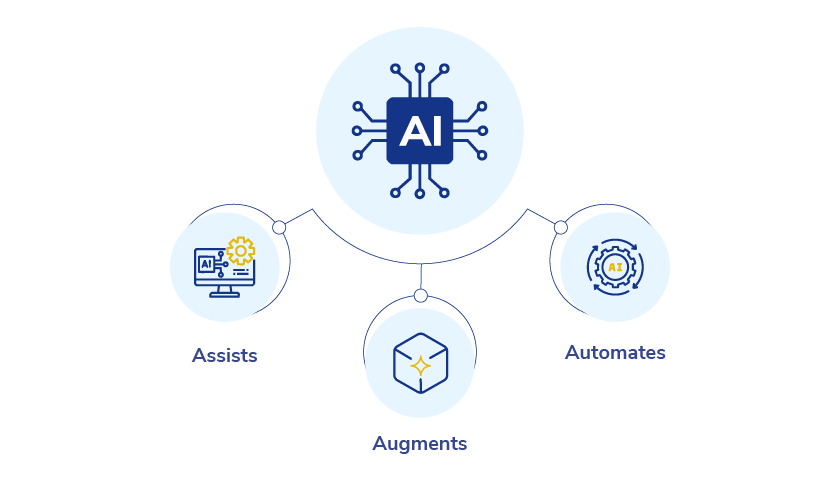Table of Contents
- Rethinking Layoffs in the AI Era
- What Jobs Are Really Affected by AI
- What Gen AI Means for the Workforce
- The Most Important Question
- Layoffs due to AI
- Bottom line
- Mid-Level Roles: The Quiet Winners in the AI Era
- How HR Should Respond to AI-Linked Layoffs
- We Asked Gen AIs What They Think About Layoffs
- Wrapping Up
We’ve been seeing constant news updates about layoffs due to AI across major organisations. And while AI often takes centre stage in the conversation, it’s essential to understand.
AI is not the villain, but it is in the room.
The real story is far more complex and collaborative. The phrase “AI is taking over jobs” has become a concern, even a social media cliché. But the real reasons causing tech layoffs are multi-layered.

In fact, according to NBC News:
“Out of 286,679 layoffs in a year, only around 20,000 were associated with automation.”
That’s less than 7%. So, Why do people think AI the reason for layoffs? Because it’s the newest, shiniest part of the puzzle, and humans naturally question the unknown.
Rethinking Layoffs in the AI Era
Most CEOs aren’t blaming AI. Instead, they’re saying something deeper:
“The way we work is being reimagined.”
This reimagination includes AI as a collaborative force, not a cold, calculating substitute. The goal isn’t replacement, but realignment where AI handles the repetitive and mechanical, and humans focus on strategy, empathy, creativity, and context.
But during this transition, layoffs may happen. It is not because AI is better, but because businesses are restructuring and evolving too quickly without preparing the people who built them.
Many believe companies adopt AI to cut costs. Ironically, the initial cost of AI implementation is huge.
- Massive investment in data centres and chips
- High cost of training AI models and building workflows
- Continuous costs of monitoring and adapting AI to each function
These efforts are not instant money-savers. Instead, they’re strategic plays and hoping that automation in certain areas will free up humans for higher-impact tasks.
The problem? Transition isn’t always graceful.
What Jobs Are Really Affected by AI?
Let’s separate myth from reality.
- According to Indeed, 36% of tech job postings are down since 2020, partly due to automation trends.
- Entry-level developer hiring has slightly declined since 2022.
- Creative fields like writing, design, and marketing have started blending AI tools into daily tasks, not to eliminate jobs but to elevate efficiency.
Not all roles are equally affected by AI layoff, and humans are still central to all outcomes.
What Gen AI Means for the Workforce?

According to Forbes, the CEO of Fiverr aptly highlighted:
“In the age of AI, professionals with average skills will find it difficult to survive, and only exceptional employees will thrive.”
This doesn’t mean mediocrity is punished, but the demand for value has changed. Some companies have made mistakes by replacing full teams with AI tools only to re-hire human professionals within a year. The message is clear: AI can only go so far without human context, oversight, and creativity.
The Most Important Question: What Jobs Should AI Do? What Jobs Should Humans Do?
The future belongs to companies that can intelligently divide tasks between AI and humans:
| Tasks Suited for AI | Tasks Suited for Humans |
|---|---|
| Data processing & entry | Critical thinking |
| Pattern recognition | Empathy-driven decisions |
| Summarizing long texts | Original writing with voice & tone |
| Scheduling & reminders | Strategic planning |
| Basic code & testing | Architecture & systems thinking |
A company that gets these wrong risks chaos. It’s not just about being AI-first but also being people-smart and AI-wise.
Layoffs due to AI: Which Jobs Are Vulnerable?
Experts and researchers have come up with contradictory perspectives, and these are all assumptions for now. It might take a decade (or at least half of it) to truly understand the AI-human workplace dynamic.
Entry-Level Jobs
- These roles are the first to be considered for automation. But rather than cutting them, businesses should rethink them.
- It’s time to align education with AI-enabled futures. Students should be learning AI-assisted work, not fearing irrelevance.
Experienced Professionals
- If experienced roles become redundant, the issue lies not with AI but with how quickly upskilling is happening. AI should free up leaders, not sideline them.
Though the debate continues, it’s important to understand that employees, regardless of skills and experience are susceptible to being replaced by AI. All job levels face transformation, not extermination.
Mid-Level Roles: The Quiet Winners in the AI Era?
Yes, surprisingly. Mid-level professionals are thriving because:
- They have domain knowledge
- They can adapt tools quickly
- They act as bridges between strategy and execution
With AI by their side, they’re finishing work faster and with better precision.
How HR Should Respond for Layoffs due to AI?
Instead of thinking, “Who do we fire now?” HR should ask:
“How do we make every employee AI-capable?”
- Train juniors to use AI as their mentor
- Free up seniors to work strategically instead of managing the basics
- Create hybrid workflows that empower rather than eliminate
The smartest HR teams won’t cut—they’ll transform.
We Asked Gen AIs What They Think About Layoffs Due to AI
To close this discussion, we’ll be asking ChatGPT, Gemini, and others what they think about being blamed for layoffs.
Spoiler: Even they’ll tell you they don’t want your job. They want to assist you at yours.
Gemini: The idea of AI “taking” jobs is a bit of a misnomer; it’s more accurate to say we’re experiencing a major shift. While some tasks become automated, freeing up humans from repetitive work, new roles are emerging that require us to be more creative and strategic. The focus is now on collaboration, with AI serving as a powerful co-pilot to augment our human capabilities.
ChatGPT: “AI isn’t here to replace humans — we’re here to assist, not resist. Layoffs are a result of business choices, not AI’s agenda. Think of us as co-pilots, not competitors.”
Wrapping Up
It’s tempting to dramatize the AI revolution. But the truth is more grounded. AI is not a threat. It’s a tool. And like every great tool, it depends on who’s using it. Layoffs due to AI may happen, yes. But it is not the executioner. It’s the enabler when used responsibly, with vision and empathy.

